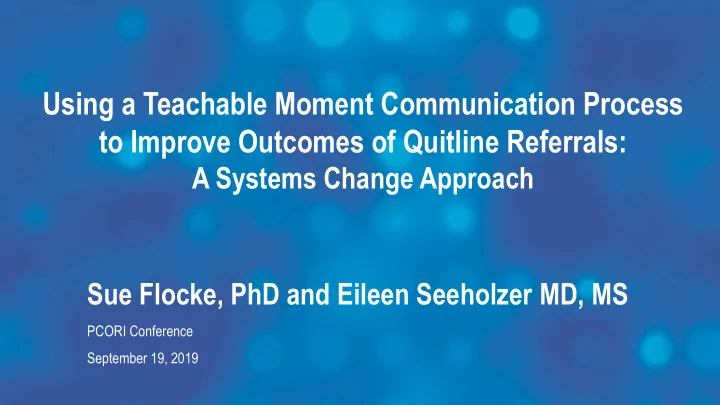

Using a Teachable Moment Communication Process to Improve Outcomes of Quitline Referrals: A Systems Change Approach Sue Flocke, PhD and Eileen Seeholzer MD, MS PCORI Conference September 19, 2019
Disclosures The authors have no conflicts of interest to disclose. Funding source: This study was supported by a contract from PCORI IHS-1503- 29879. The findings and conclusions in this presentation are those of the author and do not necessarily represent the official position of the Patient Centered Outcomes Research Institute.
Background • The burden of smoking tobacco on morbidity and mortality is substantial, and rates have not declined for the lowest economic classes. • Guidelines urge primary care providers to ask, advise and refer patients to tobacco cessation services, but this is infrequently done.
Evidence-based strategies and resources Ask-Advise-Connect strategy Teachable Moments Communication Process Quitline electronic health record (EHR)
Goals • Provide tobacco cessation support using multiple evidence-based strategies • Whole system & team approach • Could be replicated in other systems, regions and states; • Was sustainable and not dependent on the research project; • Fit needs of the health system and patient population • Partner with MetroHealth a safety-net health system with exceptional EHR expertise and high rates of smoking.
Study Aims: Improve the delivery of smoking cessation brief advice and assistance to socially and economically disadvantaged patients using two strategies: 1. A systems-based Ask-Advise-Connect approach 2. A clinician-focused Teachable Moment Communication Process and elicit narratives of patients’ experiences with tobacco cessation assistance.
Overall study scheme Implement Ask- Implement Baseline Advise-Connect Teachable Moment period System change clinician training EHR data collection for process and outcome variables Qualitative data collection for patient experience
Ask-Advise- Connect
Ask-Advise- Connect Preparation: 1. Establish e-referral capacity 2. Changes to EHR 3. Role and process changes for medical assistants Implementation: 1. Training, audit and feedback
Evaluation Tested in 8 community primary care sites Key outcomes for Ask-Advise-Connect • Process variables: uptake of tobacco assessment and assistance • Contact rate by the quitline • # counseling sessions by the quitline
Ask Advise Connect Findings Figure 1. % Ask (in the last 30 days…)
Ask Advise Connect Findings Figure 2. % Advise
Ask Advise Connect Findings Figure 3. % Assess readiness
Ask Advise Connect Findings Figure 4. % Accepted referral
Quitline Referrals
Summary points This systems-based strategy resulted in substantial and sustained increase in: • Documentation of smoking and advice • Connection to assistance for cessation The contact and enrollment by the quitline is modest. • Much to learn about individuals who say they are ready and want help, but are not able to be contacted.
Teachable Moment Communication Process • A relationship-centered approach; attending to salient concerns; meeting patient where they are; supporting patient decision to act or not act today; situation specific. • Training in groups at clinical practices • Interactive video • Skill practice with 6 standardized patient scenarios and coaching • Support with new EHR document flowsheet
Teachable Moment Findings • 44 of 60 eligible clinicians received training • Median module quiz score - 80% correct • 68% used the doc flowsheet 1 or more times after training. • Median 15, IQR 2-33 • 17 used it more than 10 times; 4 used it more than 50 times. • 660 visits out of 8199 • Increase in tobacco cessation medications ordered • 30% vs 9%, OR=4.82, 95% CI=3.90, 5.94 • No improvement in referrals, contact or enrollment.
Patient narratives of the experience • Qualitative interviews of patient experience • 55 interviews – ‘unreachable,’ disenrolled, completors • Reasons for not engaging with the quitline: • Misunderstandings of what is offered • Discomfort with phone counseling • Already quit smoking • Life circumstances and events making cessation unviable • Completors: valued experience, wanted more follow up
Summary points • The Ask-Advise-Connect strategy resulted in substantial and sustained increase in tobacco assessment and assistance. • Teachable Moment, when used, improved medication orders • Patients report that they want ongoing help and follow-up. The quitline services meet the needs of some, but not the majority. • Systems change research requires substantial commitment to collaboration & quality improvement on the part of all partners.
Study Limitations • Low uptake of Teachable Moment strategy. • Integration of interventions via the EHR was not fully realized. • Process variables were assessed from EHR – possibly under- reporting delivery of advice and offers of assistance. • Conducted at 8 sites within one health system. Rolling this out across multiple systems will require substantial work
eReferral + Teachable Moments Study Team Co-authors Other Partners MetroHealth Staff Eileen Seeholzer, MD, MS Clinical staff Elizabeth Antognoli, PhD Informatics Thomas Love, PhD Population health David Kaelber, MD, PhD Epic trainers Steven Lewis, MS, MBA Information systems India Gill, MPH Other Organizations Elvira Ordillas, RN National Jewish Health Jeanmarie Rose, MPA Ohio Department of Health Patient representatives
Questions and comments? Sue Flocke flocke@ohsu.edu Eileen Seeholzer eseeholzer@metrohealth.org
Recommend
More recommend